FCC Approves MSS Part 5 Reconsideration Request
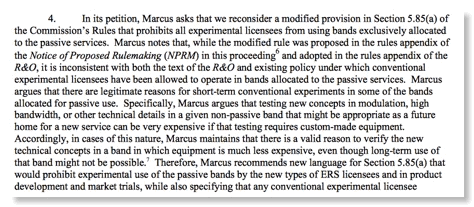
On July 8 FCC released an MO&O&FNPRM in Docket 10-236, formally captioned “Promoting Expanded Opportunities for Radio Experimentation and Market Trials under Part 5 of the Commission's Rules and Streamlining Other Related Rules”. This decision deals with 3 reconsideration requests, one of which was filed by your blogger. They relate to the January 31, 2013 FCC decision to revise the experimental licensing rules. In that decision the new rules forbid for the first time all experimental licenses in bands with only passive allocations. While this language had been in the NPRM’s draft rules, it was never mentioned in either the discussion sections of the NPRM or the R&O and quite probably was a drafting error.
We got involved in this issue after signing a new client in May 2013 who was having problems getting experimental licenses for millimeterwave technology experiments. In researching the issue, we noticed that the new rules were about to go into effect that would have made the task nearly impossible due to a new prohibition on any experiment in any passive only band regardless of its impact on passive spectrum users. Having noticed this 2 days before the reconsideration filing deadline, it was not possible to convince the new client to both file and approve the drafting so as a public service we did it pro se and filed our own Petition for Reconsideration. We subsequently got supporting comments from both Boeing and Battelle Memorial Institute. No party opposed this issue.
The Commission apparently agreed with our logic stating
“As Marcus observes, Section 5.85(a) of the rules appendix in the R&O is inconsistent with both our existing treatment of conventional ERS licenses and the text of the R&O. This inconsistency arose in the NPRM, where the text proposed that only program licenses would be prohibited from using “restricted” bands (including passive service bands) listed in Section 15.205(a) of the Commission’s Rules. In contrast, Section 5.85(a) of the rules appendix proposed that all experimental use of “any frequency or frequency band exclusively allocated to the passive services” be prohibited. This inconsistency was not addressed by any commenting party, but the Commission’s stated intent in the text of the R&O was to continue previous practice regarding conventional ERS licenses.”
The new rules have the following reasonable safeguards to minimize unnecessary emissions in the passive bands:
§ 5.85 Frequencies and policy governing their assignment.
(a)(1) Stations operating in the Experimental Radio Service may be authorized to use any Federal or non-Federal frequency designated in the Table of Frequency Allocations set forth in part 2 of this chapter, provided that the need for the frequency requested is fully justified by the applicant. Stations authorized under Subparts E and F are subject to additional restrictions.
(2) Applications to use any frequency or frequency band exclusively allocated to the passive services (including the radio astronomy service) must include an explicit justification of why nearby bands that have non-passive allocations are not adequate for the experiment. Such applications must also state that the applicant acknowledges that long term or multiple location use of passive bands is not possible and that the applicant intends to transition any long-term use to a band with appropriate allocations.” (These last two sentences are a minor modification of our proposed wording on p. 14 of our Petition.)
When Docket 10-236 was initiated the Commission boldly stated
“The Federal Communications Commission today launched two proceedings that will help to promote investment and create jobs in developing innovative spectrum-efficient technologies and services to help meet the growing demand for wireless broadband services. The first action is a Notice of Proposed Rulemaking that seeks to expand the FCCÆs existing Experimental Radio Service rules to promote cutting-edge research and foster development of new wireless technologies, devices, and applications.”
Chairman Genachowski went on to state:
“With these two items, we build on our efforts to use spectrum more efficiently and in ways that deliver the highest value for the American people, and to encourage groundbreaking innovation….The goal is to accelerate innovation – to reduce the time for an idea to get from the lab to the market. A more extensive experimental licensing program would also help the FCC make smarter, faster decisions, by giving us on-the-ground intelligence on interference issues, and insight into the development of new cutting edge technologies. Encouraging research and development is vital to our objective of making the U.S. the spawning ground for the great technological advances of tomorrow. Past advances in technology, such as cellular networks and improvements in digital transmission techniques have led to vastly improved efficiency in spectrum use.”
While no one could disagree with these goals, this proceeding — like many other spectrum policy issues that are not the focus of large trade associations — is limping along on a very low priority and in the FCC as presently funded and operating that means things are getting done very slowly. Note that the revised rules in the R&O only went into effect 5 months after the adoption and release of the R&O, no doubt due to “back office problems” due to short staffing in the unglamorous parts of FCC where “there rubber hits the road”. Note also that while this docket adopted the new program license category for experiments, these are not yet available due to delays in getting funding within FCC to update the website for applications and then more back office problems with OMB approval of information requests.
Finally, note that this reconsideration under was related a little more than 2 years after the filing of reconsideration requests. This type of delay is typical for all spectrum items not related to incentive auction issues. (Note that the delays dealing with Docket 10-4 and the FM/LTE problem show that even the cellular industry can not get timely attention on non-incentive auction issues!) We note that some commissioners think there is currently too much delegated authority to FCC staff. Look at the new decisions and think about whether any of these issues needed or gained value from deliberations from 5 presidential appointees confirmed by the Senate?
In the coming months a major issue in this blog will be improving FCC spectrum policy productivity to keep up with the dynamic requirements of the spectrum-related industries and to help US competitiveness. We believe that productivity can be improved without new legislation, although new funding may be needed. (FCC costs are matched by user fees so new funding would not involve new tax dollars.)
UPDATE
Discussion of same decision from our friends at CommLawBlog.
"Aux Armes" Netoyens:
End the War on Millimeter Wave Technology

The chorus of the Marseillaise, the French national anthem begins with:
Which translate toAux armes, citoyens,
Formez vos bataillons,
Marchons, marchons !
To arms, citizens,
Form your battalions,
Let's march, let's march!
(While I lived in Paris, I often walked by Eugène Delacroix’s masterpiece Liberty Leading the People [La Liberté guidant le peuple] while visiting the Louvre. [Oddly, the painting also made a rare overseas trip to Tokyo in 1999 when I was living there and was the hit of the town during its visit.] The words of the Marseillaise and the picture describe events and the initial idealism of the French Revolution. But while the”armes”/“arms” in the above lyrics means weapons, what is needed in the context of this post is the use of human arms to write to FCC and advocate constructive action.)
The commentators of Fox News repeatedly comment on the “war on coal” and the “war on religion”. Well, the “war on millimeter (mmW) wave technology” at FCC is just as real and easier to document, although it is no doubt unintentional. There are 3 proceedings at FCC that document FCC’s present disinterest/apathy towards commercial use of cutting edge microwave technology, even as our national competitors advance in this area.
While not exactly an issue comparable to the causes of the French Revolution, the current situation of US regulation >95 GHz needs the urgent attention of “netoyens”, especially researchers and firms dealing with millimeter wave technology. While the FCC Rules have spectrum allocations up to 275 GHz, the lack of “service rules” beyond 95 GHz (with the minor exception of certain amateur radio and ISM bands) makes regular commercial licensed or unlicensed mmW use impossible. This in turn greatly complicates capital formation for such technology because VCs can easily find other technology to invest in that does not involve making a prominent FCBA member a member of your family for several years and paying his children’s college tuition while at the same time the entrepreneur has no access to market and bleeds red ink.
Sadly, with the exception of the IEEE 802 LAN/MAN Standards Committee (the techies behind Wi-Fi standards), Boeing, and the more obscure (at least in FCC circles) Battelle Memorial Institute and the rather obscure Radio Physics Solutions, Inc., no commercial interests have filed comments with FCC on 3 key issues blocking capital formation for technology above 95 GHz and by extension hindering US competitiveness in advanced radio technology.
The 3 dockets involved are:
- Docket 10-236 which as previously reported here was supposed to encourage experimentation had the apparently unintended effect of complicating millimeter waver research by forbidding, for the first time and without an explanation, all experimental licenses in bands with only passive allocations independent of whether there was any impact. Many mmW bands have only passive allocations and it is difficult a and expensive to avoid them in initial experiments with new technology and it is not important if there is no passive use near the experiment than could get interference. Since the text of the Report and Order contradicts itself on this issue, the simplest explanation is that a sentence was put in the wrong section. Your blogger filed a timely reconsideration petition when he noticed this 2 days before the deadline and that had been supported by Battelle and Boeing and has been opposed by none. But FCC doesn’t necessarily react in a timely way, specially when incentive auctions are very distracting and staffing is low, unless there are multiple expressions of concerns, preferably from corporate America.
- Docket 13-259 deals with the IEEE-USA petition seeking timely treatment of new technology proposals for this green field spectrum >95 GHz under the terms of 47 USC 157, although any clear statement from FCC on how to get timely decisions on such spectrum would be useful.
- Docket 13-84 has proposed updating the Commission’s RF safety rules. The rules currently only have numeric limits up to 100 GHz - the upper limit of the standard they were based on when they were last updated almost 2 decade ago - but the new proposals are silent on numeric limits above 100 GHz even though the standard that is now the base of the regulations now goes to 300 GHz! This lack of a specific safety standard above 100 GHz adds even more to the regulatory uncertainty of those interested in mmW technology. With today’s mmW technology, the specific numeric standard doesn’t really matter much because exposures will be low. But this proposal to leave ambiguity for mmW systems can be very damaging. Battelle has proposed one way to deal with a specific standard. Others interested in mmW technology should either support it or propose an alternative.
So netoyens, Aux armes! The time has come to take your arms (and the attached hands) and write to FCC urging timely action on these three dockets to level the playing field for mmW technology and help US competitiveness.
As a public service, Marcus Spectrum Solutions LLC will draft comments in these 3 dockets for any US manufacturer of mmW equipment dealing with the issues above at no charge to reflect whatever your viewpoints are.
(Note MSS is not licensed to practice law so this offer does not involve the practice of law. Let’s discuss what your viewpoints are and we will draft a document for review by your legal staff.)
Japanese 120 GHz system used at 2008 Beijing Olympics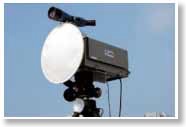
German 237 GHz System exceeding 100 Gbits/s
( An experiment probably not permitted under the terms of the recently revised §5.85(a))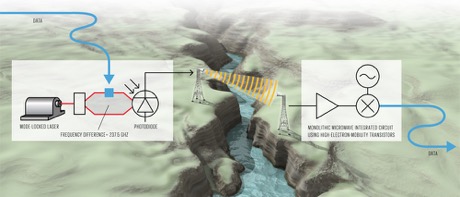
Chrysler Superbowl Ad on “American Pride” - MSS believes that advanced wireless technology is just as American as automobile production in Detroit. US can compete if FCC doesn’t slow innovation!
FCC Requests Comment on IEEE-USA >95 GHz Petition
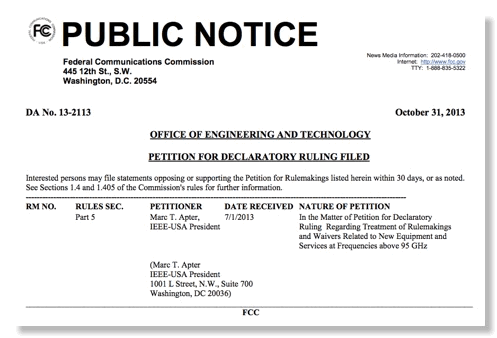
In a Halloween present to your blogger, FCC released the above PN asking for comment on the previously discussed IEEE-USA petition to expedite deliberations on technology >95 GHz in accordance with the terms of Section 7 of the Communications Act.
In an apparent clerical error they omitted either an RM number or a Docket number creating an ambiguity on how to actually file comments. A knowledgeable source says this happens sometimes and is normally corrected in a day or 2.
We look forward to seeing your comments.
vox populi, vox dei
UPDATE
FCC issued an erratum on November 1 and now this issue is docketed as ET Doc. 13-259.
By my calculation, comments are due December 2, 2013.
For those who do not do this often, the link for uploading a comment into this docket is at
http://apps.fcc.gov/ecfs/upload/display?z=e83p0
Convert your comments to .pdf format before uploading to FCC
.
Remember to enter 13-259 in the first entry block labeled
“Proceeding Number: ![]() ”
”
If you need any help, place contact your blogger
IEEE-USA Petition to FCC on Speeding >95 GHz Deliberations Under Terms of 47 USC 157
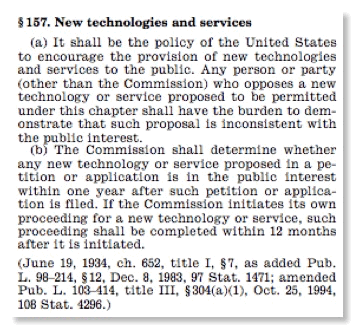
Section 7 of the Communications Act, shown above, was passed by Congress in 1983 and signed by President Reagan. It was then ignored in a bipartisan way by all FCC chairmen and virtually all commissioners for nearly 30 years. As reported here almost a year ago, it was “rediscovered” by Comm. Ajit Pai and was the focus of a speech he gave at Carnegie Mellon University on July 18, 2012.
On July 1, IEEE-USA, the US arm of the multinational engineering society filed at FCC a petition to ask to a declaratory ruling by the Commission that technology above 95 GHz presumptively qualifies at new technology under Section 7. Why 95 GHz? That is the upper limit for both licensed radio systems and unlicensed use under present rules.
(Part 18 ISM equipment may operate at 2 narrow bands above 95 GHz and Amateur Radio Service licensees have access to 3 bands above 95 GHz as well as “above 275 GHz”. Neither of these exceptions will stimulate a market for commercial products.)
The IEEE-USA petition seeks to have FCC presumptively declare that technology above 95 GHz is “new technology” in the context of Section 7 and thus entitled to the “burden” test if Section 7(a) and the timeliness requirement of Section 7(b).
mmW antennas & a dime

But the real issue here is uncertainty about FCC policy and the resulting regulatory risk that discourages capital formation for innovative technology. In the past few months I asked 5 prominent lawyers who specialize in spectrum issues how long it would take to a developer of >95 GHz technology to get FCC rules in place for normal sale and licensing (or unlicensed use) of the technology. One said 2 years, the other 4 said 4-5 years based on recent FCC performance in proceedings like UWB, AWS-3, and LightSquared.
Venture capitalists and “angels” have many people seeking funding for innovative technologies, most of whom are not subject to the regulatory uncertainties of FCC wireless technology regulation. These other technologies are therefore much more attractive to such capital than innovative wireless technology.
Furthermore, our major international competitor countries have a “state capitalism” viewpoint of wireless technology and regulation where the government “encourages” investment in chosen technologies, in some cases with government-controlled funding and coordinates spectrum policy to match the investments.
That is not the US system and probably should not be the US system. But it puts our technology developers, as well as our international competitiveness, at a real disadvantage if FCC does not consider such innovative technology in a timely way.
Hopefully FCC will request public comment on this petition quickly.
vox populi, vox dei



![Validate my RSS feed [Valid RSS]](valid-rss-rogers.png)

